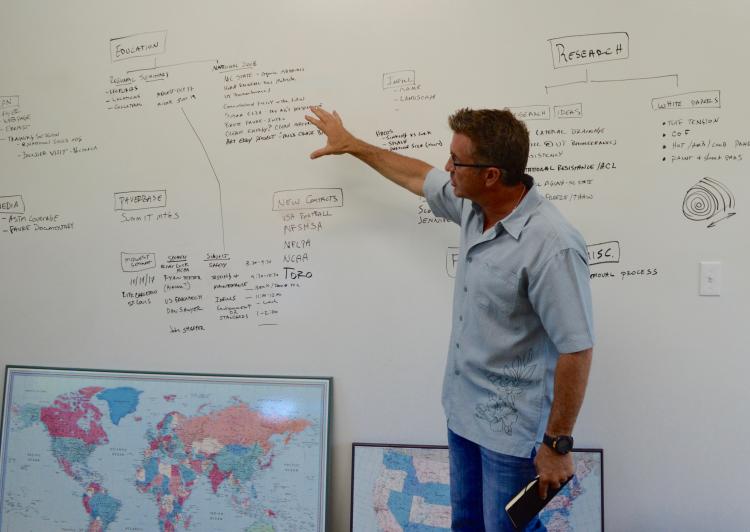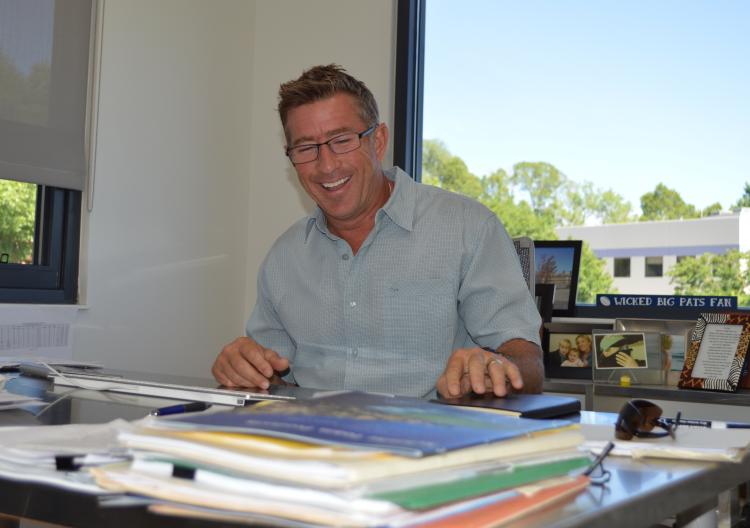Local entrepreneur tackles athletic turf field safety, proving there’s more beneath the surface
CU alum and Brock USA founder Dan Sawyer runs his business by taking athletes’ health and global sustainability into account
The experience of watching a professional, college or high school football game is hardly different today than 20 years ago. The doctors and trainers who look after the athletes, however, would certainly see a distinction, and they have Dan Sawyer, the University of Colorado Boulder alumnus who is founder and CEO of Brock USA, partly to thank for it.
An athlete’s potential for suffering a ground-impact concussion or injury can now be decreased by nearly 50 percent, and the reason is the development and availability of a polypropylene Shock Pad product designed in Boulder by Brock USA, as part of their artificial turf padding PowerBase Pro line, and sold throughout the world.

Dan Sawyer (history '88), Founder and CEO of Brock USA, demonstrates one aspect of his brainstorming process. Photo by Craig Levinsky.
PowerBase Pro Shock Pads cushion the play at college football stadiums and practice fields at Harvard, Dartmouth, Boston College, Georgia Tech, Stanford, and at facilities for NFL teams such as the Houston Texans, Dallas Cowboys, Arizona Cardinals, New England Patriots, Baltimore Ravens, not to mention countless other professional, recreational and high school athletic fields across the country. Brock USA’s PowerBase Pro product accounts for roughly 80 percent of the market share in artificial turf safety padding.
Sawyer (history, ’88) established the company in 1998 with his step-father, their sights set not on athletics at the time but, rather, the medical-supply industry.
Sawyer’s step-father had already built and sold a pair of successful companies in Boulder, one in wheelchair-seating technology, the other in hospital beds for the critically ill. After he sold those companies, he gathered a small circle of confidantes that included Sawyer and asked, “What’s next?”
Brock USA had been experimenting with liquid-to-solid polypropylene technology, “and ended up creating this really interesting impact-absorbing, breathable body padding,” said Sawyer. “We were going to be the Gore-Tex of athletic padding,” he said.
Specifically, they aimed to sell their padding product to athletic-equipment companies such as Nike and Ridell. Unfortunately, it wasn’t so easy, and Sawyer needed to regroup and modify Brock’s entire mission.
Around 2004, Sawyer’s step-father retired, and restructuring the company and its objectives proved a challenge for Brock during the next seven years. “I love the business now,” said Sawyer. “But when you’re struggling and raising money, it’s not that fun. But we’re also research-focused, and I’m competitive by nature. And I knew the science was on our side. I knew that if we stuck it out long enough, the market would come on board.”
The humanities give people a sense of other cultures, languages and viewpoints in the world, which we need now more than ever. So, maybe that’s what the humanities can teach people to do well, to listen."
Meanwhile, rising concussion and injury rates in football, alone, became too obvious to ignore; and growing instances of Chronic Traumatic Encephalopathy (CTE), a degenerative brain disease commonly found in athletes, brought greater awareness to modern-day health and safety issues, including the relatively ignored CTE epidemic.
With few advancements made since its Houston Astrodome introduction in 1966, artificial turf fields needed a better padding alternative to the original carpet-over-cement approach still being used into the 2000s.
Rather than play catch-up with sports science and medicine, soon, sports science caught up with Brock USA, and business came calling. Sawyer now estimates the artificial-turf industry grows at a rate of 6 percent annually, while Brock USA, in contrast, is growing at 40 percent, with product lines delivering well beyond just their PowerBase and Shock Pad lines.

"The key is to love what you do." - Dan Sawyer. Photo by Craig Levinsky.
The bulk of Brock’s business is the PowerBase Pro line. “Second is our PaverBase product,” said Sawyer. “Third, we’re working on new technologies that can be used way outside these spaces for consumer products, medical products,” and so on, all of which Brock manufactures in order to meet high environmental standards.
“We’re proud to be the only company in the artificial turf world to have attained a Cradle-to-cradle certification on our PowerBase product lines,” reads the Brock USA website.
“Cradle-to-cradle is the pinnacle right now of the sustainability initiative,” explained Sawyer. “It’s a complete, closed loop sustainability story. Cradle-to-cradle means you can start with a polymer and engineer it into a product. After it’s in use, you can retrieve it and either completely reuse it as is, or take it all the way down to the original polymer and turn it back into a product of equal quality as when it was first created. We can make thousands of useful products out of it.”
Sawyer emphasizes that there’s no material degradation in Brock’s production and recycling methods, and nothing is ever thrown out.
Mind you, Sawyer majored in history, not engineering or environmental science, although it’s his experience as an entrepreneur that has informed his opinion that the future of the world, its sustainability and economic markets are in the hands of those with liberal arts and humanities backgrounds.
“Today, everyone thinks you need to be an engineer or a mathematician. When I hire, I look for people who can communicate and write. Being able to write is the single most important skill I find in people, because at the end of the day, business is about the interaction of people. All my sales people are in communication,” said Sawyer.
About Brock USA’s future, Sawyer said, “We follow the idea streams. The marketplace is always coming up with ideas. You just need to be able to listen. The humanities give people a sense of other cultures, languages and viewpoints in the world, which we need now more than ever. So, maybe that’s what the humanities can teach people to do well, to listen,” he said.
“We listen to the needs of the market, and throw our engineering and creativity toward solutions. When it comes to ideas, there is no end in sight.”
It’s rather impressive for a company, as Sawyer put it, “accused of being tree-hugging hippies from Colorado.”

